| Article ID | Journal | Published Year | Pages | File Type |
|---|---|---|---|---|
| 1239894 | Spectrochimica Acta Part B: Atomic Spectroscopy | 2012 | 5 Pages |
The purpose of the present work was to optimize the conditions for the determination of arsenic in gasoline with hydride generation–graphite furnace atomic absorption spectrometry after acid digestion using a full two-level factorial design with center point. The arsine was generated in a batch system and collected in a graphite tube coated with 150 μg Ir as a permanent modifier. The sample volume, the pre-reduction conditions, the temperature program and modifier mass were kept fixed for all experiments. The estimated main effects were: reducing agent concentration (negative effect), acid concentration (negative effect) and trapping temperature (positive effect). It was observed that there were interactions between the variables. Moreover, the curvature was significant, indicating that the best conditions were at the center point. The optimized parameters for arsine generation were 2.7 mol L− 1 hydrochloric acid and 1.6% (w/v) sodium tetrahydroborate. The optimized conditions to collect arsine in the graphite furnace were a trapping temperature of 250 °C and a collection time of 30 s. The limit of detection was 6.4 ng L− 1 and the characteristic mass was 24 pg. Two different systems for acid digestion were used: a digester block with cold finger and a microwave oven. The concentration of arsenic found with the proposed method was compared with that obtained using a detergentless microemulsion and direct graphite furnace determination. The results showed that the factorial design is a simple tool that allowed establishing the appropriate conditions for sample preparation and also helped in evaluating the interaction between the factors investigated.
► We determined As in gasoline using hydride generation–graphite furnace AAS. ► We compared three sample preparation procedures. ► A multivariate approach was used to optimize the conditions. ► Analytical performance was best for semi-open digestion.
